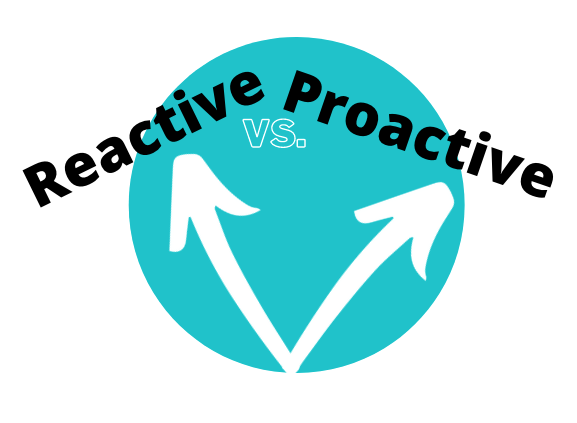Today I learned about the distinction between being Reactive and Proactive and how one little word can make all the difference. Reactive is like asking yourself “Why is this happening to me?” and Proactive is asking yourself “Why is this happening for me?” Can you see the difference? It’s so small it’s easy to miss, but it makes a big impact.
When people are reactive they don’t take a pause to choose how they are going to react to a situation. Something happens and immediately they react. They might use terminology like “There’s nothing I can do.” or “That’s just the way I am.” On the other side, people who are proactive tend to take a breath, or a beat, or a moment between something happening and their response.

Proactive people are more likely to be heard saying “Let’s look at our alternatives.” or “I can choose a different approach.” This can be a really beneficial skillset to master.
Being able to choose how to respond to a stimulus in our environment is a fairly important skill to have when interacting with other people. Sure, having a quick reaction time can be extremely useful in demanding situations — for example, in the field at work, or when playing a video game, or when tugging a child away from something dangerous. These are REFLEXIVE reactions. And the quicker they are, usually the better it is for us. But when it comes to how you respond to social interactions, having a quick reaction can be to our own detriment.
When a reactive person responds to a physical blow, or a blow to their ego, they may hit back harder or use a more cutting response than the situation calls for, and this can lead to a very messy situation and later to regret. Someone punches you, you punch back, suddenly there’s a brawl and someone is headed to the hospital or worse, away in handcuffs. Perhaps a proactive person might have responded to a punch with a statement like “Whoa, whoa, let’s step back and talk about this. There’s no need to get physical. What is it that you want me to know?” And hopefully the conflict turns into communication.
Reactive people tend to have no plan for their day, they don’t usually think to ask for feedback, and they aren’t likely to have those tough conversation that lead to self-improvement. They’re the ones who complain about being stuck waiting for that new job to find them. Reactive people are often surprised when their money runs out before the month does.
Proactive people, however, tend to write daily to-do lists that they check off as they complete their tasks. They often ask friends, family and colleagues for feedback on their various projects. They are the ones who research a company before a job interview and send out resumes with cover letters that reflect their potential. Proactive people are much more likely to have an emergency fund, or savings account.
When things aren’t going your way, when you’re stuck in a crummy situation, rather than reacting with an over-arching statement like “It’s not my fault.” Instead you might decide to take a step back and look at what is going on, and see what your choices are, before deciding what to do.
Being proactive leads to less stress and more long-term success. Which will you choose to be?
Subscribe to get the latest posts sent to your email.
Copyright © 2024 by Rev. Stephen B Henry PhD.
All rights reserved.
Another Website by Ultimate Virtual Solutions
Design • Content • SEO